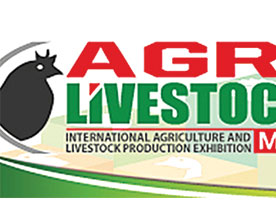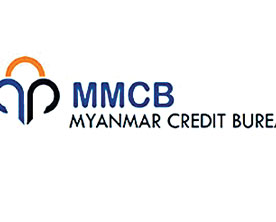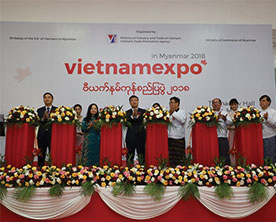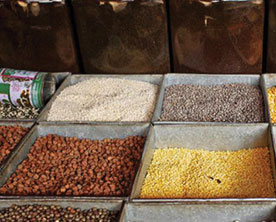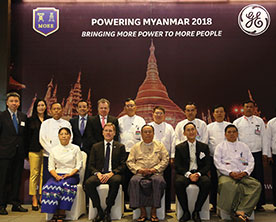If Santa Claus was real, and could wield a magic wand, all of us residing in Myanmar would present a wish list of all that we would like to see in our favorite country. The wave of optimism that had swept the country just four years ago, has given way to scaling down of growth forecasts, skepticism in general, and foreign investment has been slowing down. While there is so much to be grateful for, so much needs to be done, and the pace is not fast enough.
I walk down the streets of Yangon, and find them more crowded, cars cramming every narrow road, pedestrians cautiously weaving their way. Roads are blocked, and at traffic lights, the lines stretch endlessly. This makes me wish for a curb on car imports so that the number of cars does not increase further. Traffic is bad enough right now, and if like Singapore, the Myanmar government passes the requisite regulations, the deterioration in traffic and condition of roads can be arrested. I wonder if it would ever be possible to find clear roads and routes, like when we came to Yangon in 2013? When a ride to the downtown area took less than ten minutes from Pyay Road? The number of vehicles on the roads of cities like Yangon has multiplied even as the road network has stayed the same. The existing roads cannot be widened beyond a point, new roads would require space which the city boundary does not have, and flyovers create bottlenecks at the start and the end as they merge with flat roads.
As the sunsets, we dread the darkness, since there are barely any street lights, often jeopardizing safety. Except perhaps for parts of Kabar Aye Pagoda Road and Pyay Road, most roads stay dark. But then, I am being selfish, at least we have electricity in our homes. There are thousands who have yet to get a single bulb light up their homes in rural areas, with entire villages plunging into darkness at sunset.
Bottled water is delivered to our homes, and we cautiously avoid water outside, not to mention the amount of water that is wasted in cities, with taps left running, without a thought for the parched millions across the globe. We are skeptical about bottled water of dubious quality, while others drink whatever water is in sight, clean or not. If only they could also get water that is safe to drink.
The middle and upper classes waste food, throwing extras into dustbins, fussing about the best spread, the wide variety of food also not pleasing enough. As we sit in restaurants leaving part of our orders untouched, and so much cooked food that is thrown away every night, I wish some system would emerge to pick up these extras (which is fresh and fit to eat) from all eateries, and distribute it to the poorer, starving people on the periphery of the city, in slums. It is time to think of the thousands who sleep hungry, and do not manage three full meals a day. It is not that food in Myanmar is expensive, just that they do not have even that much money needed to fill the family stomachs. If only basics could be in place for the masses, food, health and shelter, we would then look at sustenance through education. Education holds the key to earning capability and while education is compulsory, it does not reach the stage of fruition. Education is the key to employment and earning, which teaches people not to beg, but to earn and live a life of dignity. If only education would help develop well rounded personalities and the curriculum scaled up to international standards, where knowledge stays with young minds long after the exams are over.
If manufacturing could pick up, generate employment, and ensure on-the-job training imparted to new entrants, the level of skill and competence would go up. Building capability and capacity is one of Myanmar’s biggest challenges. The gap between graduation and employment can be filled by training young people to acquire requisite skills, which would require technical training centers, management courses and so on. If only adherence to standards and practices could become a way of life, we would gain access to standardized goods and services, with no variations in quality. This would help the tourists and expatriate community trust and consume local products instead of relying only on imported products
Awareness about healthy lifestyles, access to good medical care, well equipped hospitals is slowly surfacing in cities. If only, the rural folk could gain access to these as well, if they did not have to travel for miles to reach the nearest clinic, getting the medicines required, would help the general well being. The old and the aged, infants and small children are more vulnerable to disease, and need special care.
If only safety could be maintained… as the nation grows and develops, the gap between the haves and have nots widens. The less fortunate eye all that is available, and the feeling of contentment gets replaced by craving and a sense of deprivation. This become the foundation of crime, petty thefts since this is the easiest way to get quick cash. Even the non-confrontational resort to using knives and daggers to force commuters to part with their belongings. One wonders, is it no longer safe to be out after dark?
The biggest wish is improving the pace of economic growth, by implementing investor friendly policies, inviting foreign investment, making it easier for those willing to bring in the much needed cash, to build infrastructure and industries here. The wave of optimism we all saw in 2013-14, needs to return, and getting there will require concerted effort from the government.
The country known for its Buddhist majority, is a favored meditation destination. Even as the number of tourists coming to Myanmar for meditation increases, I wish the local population continues to take out time every year for short meditation sojourns. This helps to keep the peace, inculcates contentment and abstinence from unethical, harmful activities.
Lastly, even though the list of wishes is endless, I wish we continue to see smiling faces everywhere we turn. Poor or deprived, the roads are lined with simple people who smile and laugh, extend themselves to help, and willingly share. The small boy selling flowers, or the young girl selling beetle leaf, newspapers or bottled water at traffic junctions, the smiles stay whether you buy or not. Somewhere, as simple lives get complicated, material wants begin to surpass all else, we have seen these smiles disappear as the race for wealth and acquisitions begins, and no one wishes to be left behind. The Buddhist practices, the aura of peace, the general attitude of contentment must stay, and preserve these unique features of Myanmar.
2019 wish list
- A home for all
- Education facilities in rural areas
- Electricity and power
- Medical aid, better health care
- Accelerated pace of economic growth
- More jobs and earning opportunities
- Curbing crime
- A safe life
- Peace and contentment

